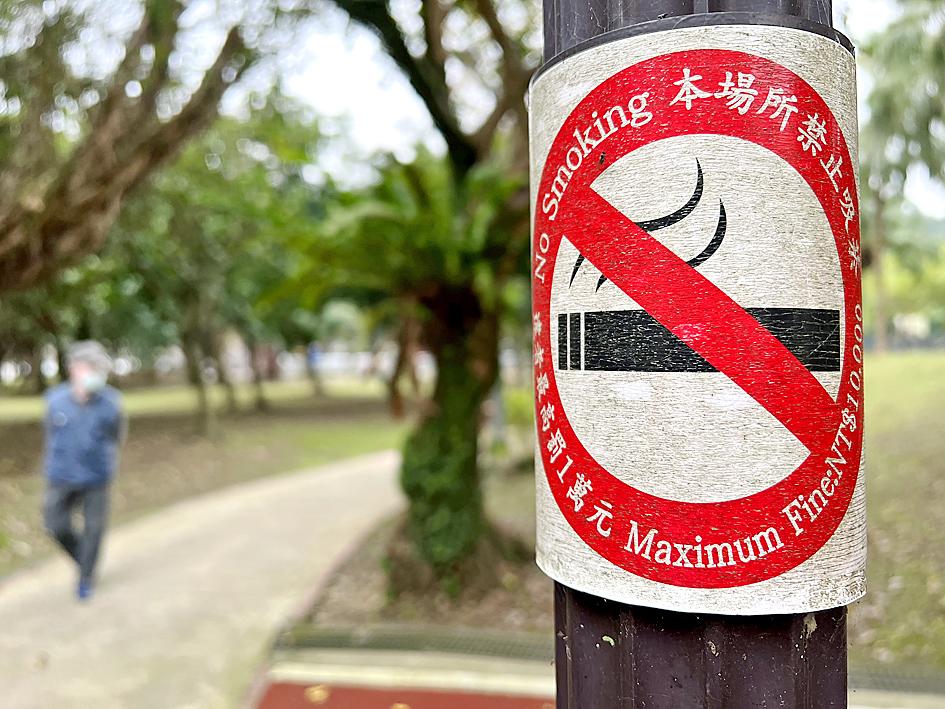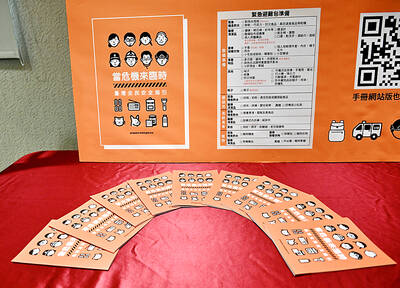The Executive Yuan yesterday approved a proposal that would raise the legal age for smoking to 20, as well as expand a list of areas where smoking is prohibited.
The proposed amendments to the Tobacco Hazards Prevention Act (菸害防治法) include redefining tobacco products, which would put e-cigarettes on a list of tobacco products that are banned from manufacturing, import, sale, provision, display, promotion and use.
E-cigarettes have “clearly provided a way for young people and those who have not smoked before to begin smoking,” the amendments say, adding that e-cigarettes, or vaping, could damage the lungs as they contain additives.

Photo: CNA
Heated tobacco products or products with additives that have unknown health risks must apply for a health risk assessment by government authorities before they can be manufactured or imported, they say.
The legal smoking age is to be raised from 18 to 20, the amendments say, citing a US study showing that people who are older when they first come into contact with nicotine would find it less addictive.
The legal age for smoking in the US, Singapore and Thailand is 20 or 21, they say.
Raising the age requirement to purchase tobacco products would be equivalent to increasing tobacco taxes by 40 percent, they say.
Warning labels on tobacco packages should cover 85 percent of the package — up from 35 percent now — to increase their visibility and encourage smokers to quit, as well as warn young people about the health risks of smoking.
The amendments also ban manufacturers from adding scents and flavors to tobacco products, as well as other prohibited additives as decreed by the government.
This could prevent young people from trying tobacco products out of curiosity, or arrive at the wrong conclusion that scented or flavored cigarettes are less harmful than conventional cigarettes, the Executive Yuan said.
Smoking would be banned in all school campuses, kindergartens, daycare centers and residences used as childcare centers, while bars, lounges and clubs would be required to set up a designated smoking room and ban smoking on other parts of the premises, the amendments say.
The amendments would also increase the fines on establishments manufacturing, importing, selling, providing, displaying or promoting “tobacco-like products,” or tobacco products that have not undergone mandatory health assessments.
Tobacco-like products refer to products that have changed tobacco materially or use other materials that are not tobacco-based, but allow the user to simulate what smokers do, the amendments say.
The proposal is to be forwarded to the Legislative Yuan for review and approval.

One of two tropical depressions that formed off Taiwan yesterday morning could turn into a moderate typhoon by the weekend, the Central Weather Administration (CWA) said yesterday. Tropical Depression No. 21 formed at 8am about 1,850km off the southeast coast, CWA forecaster Lee Meng-hsuan (李孟軒) said. The weather system is expected to move northwest as it builds momentum, possibly intensifying this weekend into a typhoon, which would be called Mitag, Lee said. The radius of the storm is expected to reach almost 200km, she said. It is forecast to approach the southeast of Taiwan on Monday next week and pass through the Bashi Channel

NO CHANGE: The TRA makes clear that the US does not consider the status of Taiwan to have been determined by WWII-era documents, a former AIT deputy director said The American Institute in Taiwan’s (AIT) comments that World War-II era documents do not determine Taiwan’s political status accurately conveyed the US’ stance, the US Department of State said. An AIT spokesperson on Saturday said that a Chinese official mischaracterized World War II-era documents as stating that Taiwan was ceded to the China. The remarks from the US’ de facto embassy in Taiwan drew criticism from the Ma Ying-jeou Foundation, whose director said the comments put Taiwan in danger. The Chinese-language United Daily News yesterday reported that a US State Department spokesperson confirmed the AIT’s position. They added that the US would continue to

The number of Chinese spouses applying for dependent residency as well as long-term residency in Taiwan has decreased, the Mainland Affairs Council said yesterday, adding that the reduction of Chinese spouses staying or living in Taiwan is only one facet reflecting the general decrease in the number of people willing to get married in Taiwan. The number of Chinese spouses applying for dependent residency last year was 7,123, down by 2,931, or 29.15 percent, from the previous year. The same census showed that the number of Chinese spouses applying for long-term residency and receiving approval last year stood at 2,973, down 1,520,

EASING ANXIETY: The new guide includes a section encouraging people to discuss the threat of war with their children and teach them how to recognize disinformation The Ministry of National Defense’s All-Out Defense Mobilization Agency yesterday released its updated civil defense handbook, which defines the types of potential military aggression by an “enemy state” and self-protection tips in such scenarios. The agency has released three editions of the handbook since 2022, covering information from the preparation of go-bags to survival tips during natural disasters and war. Compared with the previous edition, released in 2023, the latest version has a clearer focus on wartime scenarios. It includes a section outlining six types of potential military threats Taiwan could face, including destruction of critical infrastructure and most undersea cables, resulting in